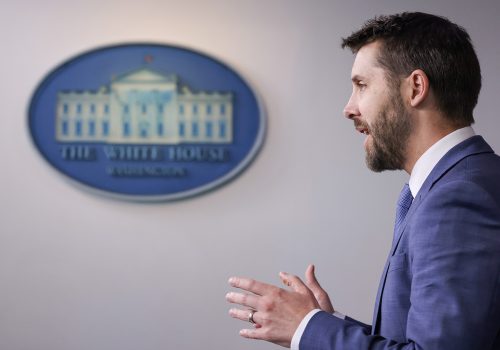GeoTech recommendations for President Biden’s meetings with allies overseas
US President Joseph Biden is poised for his first major overseas foreign affairs trip from June 10 to June 16. President Biden’s itinerary includes a G7 summit in the United Kingdom, a NATO summit and a US-EU summit in Belgium, and his first face-to-face meeting with Russian President Vladimir Putin in Switzerland. These meetings will set important precedents for the new administration’s international relations, with particular focus on significant critical technologies.
The GeoTech Center’s recent publication, the Report of the Commission on the Geopolitical Impacts of New Technologies and Data, posits that the world is entering the “GeoTech decade”—a new era characterized by interwoven geopolitics and technology, as well as increasingly “sophisticated but potentially fragile systems.” This fragility is evident in the context of a delicate global healthcare system and vulnerable supply chains, compromised by an unprecedented number of cyberattacks, trade restrictions, and disruption amidst the pandemic. Additionally, a report from NPR states that the FBI has attributed major attacks, such as the SolarWinds hack and Colonial Pipeline incident, to Russian-affiliated groups, which include REvil and Nobelium; some speculate that these groups are connected to the Russian government, raising the stakes for President Biden’s meeting with President Putin.
The potency of these attacks is exacerbated by the shift to remote working environments. In a recent study, Statista demonstrated that 44 percent of Americans worked remotely during the pandemic and argued that “different remote work models will persist post-COVID-19.” However, the American labor market has not yet recovered from the pandemic-induced crash, and onlookers remain fearful of a growing labor shortage. Additionally, increasing reliance on IT infrastructure extends far beyond the workplace. In cryptocurrencies, volatility persists even as they are legitimized by entities like El Salvador, which recently announced BitCoin as legal tender.
In a period of uncertain leaps in technological development, the Geotech Commission Report underscores the need for President Biden to “maintain science and technology (S&T) leadership, ensure the trustworthiness and resiliency of physical and software/informational technology supply chains and infrastructures, and improve global health protection and wellness.” President Biden must collaborate with international allies to “remain preeminent in key technology areas” and “take measures to ensure the trustworthiness and sustainability of the digital economy, the analog economy, and their infrastructures.” Most crucial are the report’s six key geopolitical recommendations that President Biden should consider in his trip abroad, which are instrumental for shaping policy for the GeoTech decade ahead. Below is an abridged summary.

Seven findings and actionable recommendations:
Global science and technology leadership
The United States, with like-minded nations and partners, must collectively maintain continued leadership in key S&T areas to ensure national and economic security, and that technology is developed and deployed with democratic values and standards in mind. The United States must pursue, as strategic goals, establishing priorities, investments, standards, and rules for technology dissemination, developed across government, private industry, and academia, all in collaboration with allies and partners. Collaboration among like-minded nations and partners is essential to attaining global S&T leadership.
Secure data and communications
Sophisticated attacks on software/information technology (IT) supply chains have led to significant breaches in the security of government and private networks, requiring an improved cybersecurity strategy. Such a strategy should center on updating and renewing the National Cyber Strategy Implementation Plan with a focus on streamlining how public and private sector entities monitor their digital environments and exchange threat information. Beyond these current challenges, advances in quantum information science (QIS) will lay the foundation for future approaches to securing data and communications, including new ways to monitor the trustworthiness of digital and physical supply chains. With allies and partners, the United States should develop priority global initiatives that employ and account for transformative QIS.
Enhanced trust and confidence in the digital economy
Diminished trust and confidence in the global digital economy could constrain growth; destabilize society, governments, and markets; and reduce resilience against the cascading effects of local, regional, or national economic, security, or health instabilities. Trust and confidence are diminished by practices that do not protect privacy or secure data and lack legal and organizational governance to advance and enforce accountability. As such, organizing and amplifying both automation and artificial intelligence while minimizing their weakness or vulnerabilities in open societies is essential for digital economies. The United States should develop international standards and best practices for a trusted digital economy and should promote adherence to these standards.
Assured supply chains and system resiliency
Because of their increasing complexity and design, both physical and digital supply chain vulnerabilities can have compounding negative effects on the global economy and national security. Protecting against these diverse risks requires understanding which goods and sectors of the economy are critical and how supply chains that are inherently more adaptable, resilient, and automated can be constructed. Doing so requires assessing the state and characteristics of supplies, trade networks and policies, inventory reserves, and substitutes for products or facilities. The United States should conduct regular assessments of itself and allied countries to determine critical supply chain resilience and trust, implement risk-based assurance measures, establish coordinated cybersecurity acquisition across government networks, and create more experts. A critical resource is semiconductor chip manufacturing of foreign suppliers and the long lead time and cost of new production facilities requires the United States to invest in an assured supply of semiconductor chips.
Continuous global health protection and global wellness
Inherent to the disruption caused by the COVID-19 pandemic are three systemic problems: (i) global leaders acted slowly to contain the spread of the virus, (ii) global health organizations reacted slowly to identify and contain the spread of the virus, and (iii) a mixture of factors delayed national responses, including late threat recognition, slow incorporation of science and data into decision making, low political will, and inconsistent messaging regarding the nature of the threat and what precautions to take. Though nations may adopt their own strategies to enhance resilience and future planning, a more global approach to this interconnected system is essential. The United States and its allies should lead the effort to field and test new approaches that enable the world to accelerate the detection of biothreat agents, universalize treatment methods, and deploy mass remediation, through multiple global means. Such a system is needed not only for recovering from the COVID-19 pandemic and preventing future outbreaks, but also for responding to human-developed pathogens.
Assured space operations for public benefit
To maintain trusted, secure, and technically superior space operations, the United States must ensure it is a leading provider of needed space services and innovation in launch, on-board servicing, remote sensing, communications, and ground infrastructure. A robust commercial space industry enhances the resilience of US national security by increasing space industrial base capacity, workforce, and responsiveness. It also advances a dynamic innovative environment that can bolster US competitiveness across existing industries while facilitating the development of new ones. The United States should foster the development of commercial space technologies that can enhance national security space operations and improve agriculture, ocean exploration, and climate change activities, as well as align civilian and military operations and international treaties to support these uses.
The future of work
People will power the GeoTech Decade, even as technology and data capabilities transform how they live, work, and operate in societies around the world. Successful societies must find ways to augment human strengths with approaches to technology and data that are uplifting, while also minimizing the impact of biases and other shortcomings of both humans and machines. Developing a digitally resilient workforce that can meet these challenges will require private and public sectors to take an all-of-the-above approach, embracing everything from traditional educational pathways to less traditional avenues, such as employer-led apprenticeships and mid-career upskilling. Ensuring that people are not left behind by the advance of technology—and that societies have the workforces they need to innovate and prosper—will determine whether the GeoTech Decade achieves its full promise of improving security and peace.
Matthew Gavieta is a Young Global Professional with the GeoTech Center as well as a rising senior at Cornell University, where he majors in industrial and labor relations and minors in philosophy and law & society. He is most interested in the intersection of law, policy, and technology. He hopes to do work in the field of intellectual property to promote safe, large-scale innovation and creativity.


